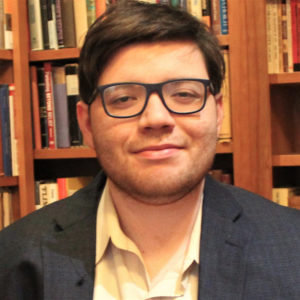Meet the Intern: Luciano Gonzalez

Please welcome our new social justice intern, Luciano Gonzalez!
What is your educational background?
I am currently a graduate student at the University of North Carolina at Greensboro pursuing a master’s in peace and conflict studies. I also did my undergraduate work there, obtaining a BA in history with a minor in anthropology in May 2017. I went to various schools growing up, including a somewhat conservative Christian private school in Fayetteville, North Carolina. I also had the opportunity to attend a fantastic private high school in Honduras for two years prior to college.
How did you first learn about humanism?
I learned about humanism shortly after becoming an atheist during my freshman year of college. I had begun researching atheist writers and secular morality, and from there I was just a few clicks away from reading my first articles on secular humanism. From the moment I first learned of humanism, I incorporated humanistic writing and works into my own ethical code. To summarize a long story of self-discovery, I’d say that I’ve been a humanist about as long as I’ve been an atheist, since the spring of 2014.
 Did you grow up in a traditional religious faith? If so, how did it impact you?
Did you grow up in a traditional religious faith? If so, how did it impact you?
My mother had a fascinating experience going from church to church, mostly Pentecostal ones, in Puerto Rico. My dad was raised by believers who went to church regularly but who identified more as Christians than as any specific sect of Christianity itself. I was raised as a Christian generally but usually went to Catholic churches and considered myself Catholic prior to high school. Being raised religiously and in religious cultures as well as learning from various religious institutions definitely affected me; it made me highly aware of how religion impacts social standing, and how religion (and religious institutions) can be a positive force for justice and progress or a negative force that backs institutions and perpetuates the status quo.
What interested you most about interning for the AHA?
The American Humanist Association is hard at work creating spaces for humanists all over the country. The work we’re doing is advancing conversations and creating opportunities for people throughout this country. I want to be there for other activists like myself who want to work but don’t know where, or in some cases, how to start. As an intern for the AHA, I’m hoping to gain skills and tools to improve as an effective organizer, activist, and representative of secular humanism to anyone who wants to learn more or get involved. I hope to use my passions for social justice and organizing to be a skilled contributor to the AHA’s success during my time here and gain new professional skills.
What book has influenced you the most?
If I have to cite just one, I’ll go with Creating Change through Humanism by AHA Executive Director Roy Speckhardt. I was beginning coursework in peace and conflict studies when I read this book, and the Humanism and Its Aspirations section in the appendix of the book was one of the documents that helped me formulate my own understanding of secular humanism and how to apply to it to my personal and professional life.
If you could have dinner with any three people (living or dead), who would they be and why?
I’d like to have dinner with Lin Manuel-Miranda, who is one of my favorite musicians and playwrights, and Justina Machado, who plays one of the first ever bilingual, Hispanic agnostics on TV, in Netflix’s hit remake of One Day At A Time. Lastly, I’d love to sit down with Dorothy Miranda Clark, also known as “Dodie,” an English musician and YouTuber who creates content revolving around mental health and emotional awareness. She has also made great videos defending YouTube as someone who is both an artist and a YouTuber.
